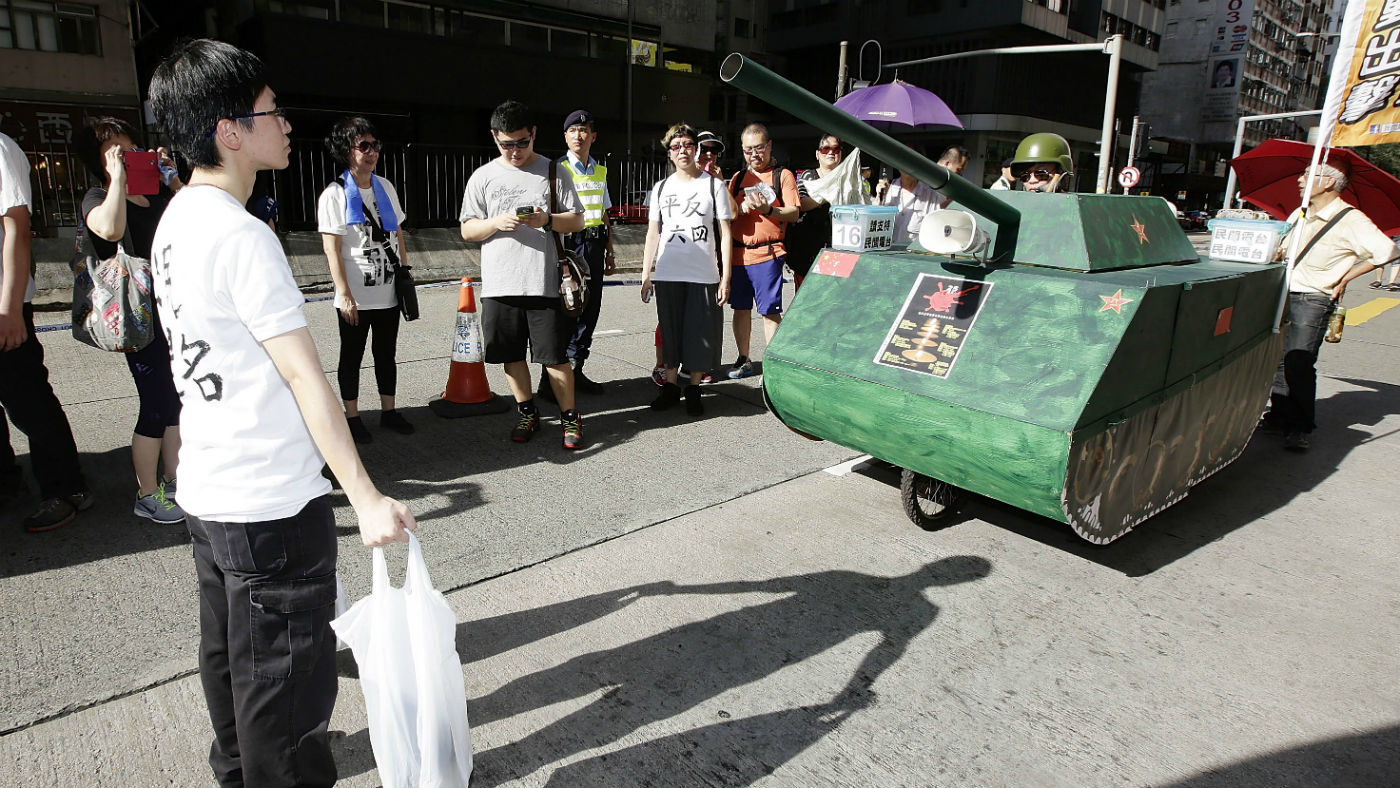Legacy of Tiananmen protests still haunts China 30 years on
Trade-off between economic prosperity and political freedoms now coming under strain

A free daily email with the biggest news stories of the day – and the best features from TheWeek.com
You are now subscribed
Your newsletter sign-up was successful
Thirty years on from the start of protests that would culminate in the Tiananmen Square massacre, the resulting trade-off between economic prosperity and political freedom is finally coming under strain.
While 4 June 1989 has gone down in history, in part thanks to the famous “tank man” photo, the origins of the protest date back earlier.
Thirty years ago on Monday, Beijing students gathered to mourn Hu Yaobang, a reformist official, kickstarting what CNN calls “the most important Chinese mass movement of the last half-century”.
The Week
Escape your echo chamber. Get the facts behind the news, plus analysis from multiple perspectives.

Sign up for The Week's Free Newsletters
From our morning news briefing to a weekly Good News Newsletter, get the best of The Week delivered directly to your inbox.
From our morning news briefing to a weekly Good News Newsletter, get the best of The Week delivered directly to your inbox.
Soon, massive crowds calling for change were converging on the central plazas of dozens of Chinese cities. On 20 May, the government imposed martial law in Beijing, and two weeks later, on 4 June, the movement ended after tanks were sent into Tiananmen Square and soldiers fired on unarmed civilians on the streets of the capital.
Estimates of the number of dead range from a few hundred to more than 2,000.
Remi Castets, an expert in Chinese affairs at Bordeaux University/Sciences Po told Euronews on the 25th anniversary of the massacre, the protesters’ demand could be divided into three main issues: the democratisation of the regime and the establishment of a multi-party system; a push to limit growing inequality; and a fight against corruption and nepotism in the party.
By brutally cracking down on protesters “the message from the Chinese Communist Party couldn’t have been clearer: Beijing would tolerate economic change, but not political change”, says Time magazine’s Michael Schuman.
A free daily email with the biggest news stories of the day – and the best features from TheWeek.com
The party has spent the intervening three decades trying to erase the protests from history, “and young people here have little knowledge or understanding of what happened that day” says the BBC.
All the while the attitude of China’s leadership has remained unchanged. While President Xi Jinping has moved to stamp out corruption and address inequality, he has also cracked down on political dissent, in the process assuming more personal power than any ruler since Mao Zedong.
Bonnie Girard in The Diplomat writes “the real and lasting legacy of Tiananmen Square is that, by not meaningfully confronting the Chinese government with palpable, long-term consequences for the murder of their unarmed citizens, extreme censorship and political repression have become institutionalised in China”.
“Today, those tools underpin the foundation of the state” she says.
Yet the trade-off between economic prosperity and political freedom which has sustained the relationship between the state and its citizens is now coming under strain.
As Castets says “as long as the Chinese government manages to maintain a growth rate above seven per cent, it can control social unrest. Because with a seven per cent growth rate, China remains able to integrate newcomers into the labour market”.
The problem is that growth has steadily fallen over the past decade, and now sits at around 6%, posing an existential threat to the regime.
Shuman says “if China is to lift itself into the ranks of the most advanced economies and rejuvenate its competitiveness, its people require the freedoms Tiananmen’s protesters fought for”.
“The Communist Party has to wake to the fact that Tiananmen’s legacy is holding the nation back” he concludes.
-
 Why is the Trump administration talking about ‘Western civilization’?
Why is the Trump administration talking about ‘Western civilization’?Talking Points Rubio says Europe, US bonded by religion and ancestry
-
 Quentin Deranque: a student’s death energizes the French far right
Quentin Deranque: a student’s death energizes the French far rightIN THE SPOTLIGHT Reactions to the violent killing of an ultraconservative activist offer a glimpse at the culture wars roiling France ahead of next year’s elections
-
 Secured vs. unsecured loans: how do they differ and which is better?
Secured vs. unsecured loans: how do they differ and which is better?the explainer They are distinguished by the level of risk and the inclusion of collateral
-
 Epstein files topple law CEO, roil UK government
Epstein files topple law CEO, roil UK governmentSpeed Read Peter Mandelson, Britain’s former ambassador to the US, is caught up in the scandal
-
 Iran and US prepare to meet after skirmishes
Iran and US prepare to meet after skirmishesSpeed Read The incident comes amid heightened tensions in the Middle East
-
 Israel retrieves final hostage’s body from Gaza
Israel retrieves final hostage’s body from GazaSpeed Read The 24-year-old police officer was killed during the initial Hamas attack
-
 China’s Xi targets top general in growing purge
China’s Xi targets top general in growing purgeSpeed Read Zhang Youxia is being investigated over ‘grave violations’ of the law
-
 Panama and Canada are negotiating over a crucial copper mine
Panama and Canada are negotiating over a crucial copper mineIn the Spotlight Panama is set to make a final decision on the mine this summer
-
 Why Greenland’s natural resources are nearly impossible to mine
Why Greenland’s natural resources are nearly impossible to mineThe Explainer The country’s natural landscape makes the task extremely difficult
-
 Iran cuts internet as protests escalate
Iran cuts internet as protests escalateSpeed Reada Government buildings across the country have been set on fire
-
 US nabs ‘shadow’ tanker claimed by Russia
US nabs ‘shadow’ tanker claimed by RussiaSpeed Read The ship was one of two vessels seized by the US military